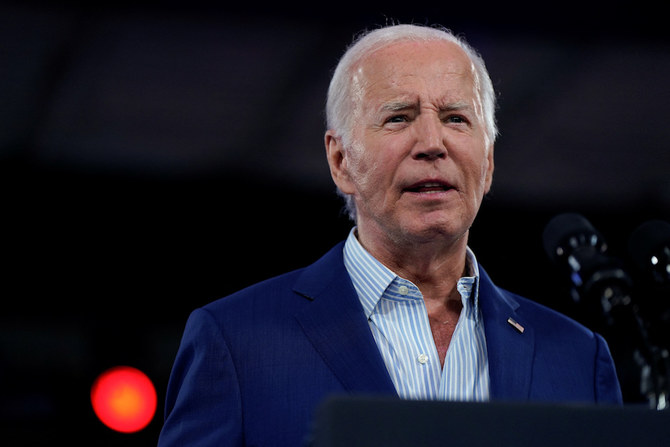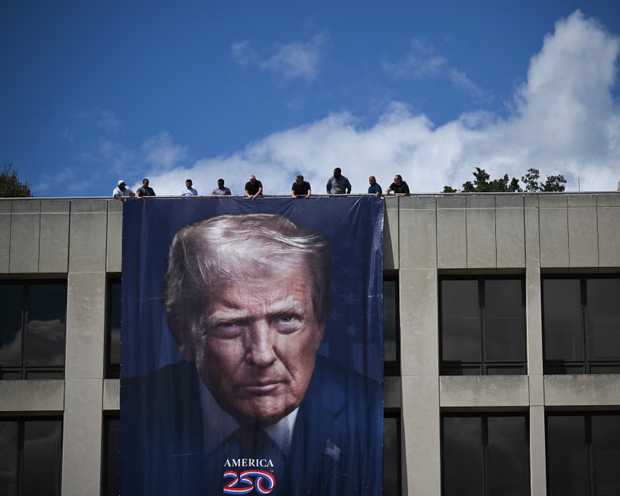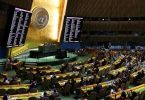Dalia Al-Aqidi
The presidential debate between Joe Biden and Donald Trump has left an indelible mark on the political landscape, stirring a mix of disappointment, shock, and concern. It was disheartening to witness the leader of the US struggling to articulate his thoughts clearly.
The debate’s agenda was broad, encompassing critical issues such as abortion rights, immigration policies, and international relations with Ukraine and the Middle East. From the outset, Biden’s performance was uneven. At 81, his halting speech and occasional raspy voice, attributed by his campaign to a cold, did little to inspire confidence and refueled existing concerns about his age and his ability to serve another term.
Trump himself is 78, and the debate brought to the forefront the age and health of both candidates. Never before have two contenders for the White House been so old, which did not go unnoticed by the public. Biden’s struggle to deliver his points coherently contrasted sharply with Trump’s more aggressive and clear-cut approach, which was a focal point for viewers and pundits alike. Vice President Kamala Harris tried to mitigate the fallout by defending Biden’s performance. She acknowledged that her boss had a slow start but emphasized his strong finish, arguing that he demonstrated a clear commitment to substantive issues over stylistic concerns. Harris pointed to the president’s broader record in office as evidence of his capability and dedication to the American people.
However, the public’s reaction was swift and telling. A snap poll suggested that 67 percent of viewers believed Trump outperformed Biden, a significant shift from pre-debate expectations when only 55 percent believed Trump would do better, and 57 percent expressed a lack of confidence in Biden’s ability to lead the country compared with 44 percent for Trump. These numbers reflect a stark reality: the debate shifted the focus from policy issues to concerns about Biden’s personal fitness for office.
The implications for the Democratic Party are profound. The debate has exacerbated internal tensions and brought to the surface the challenges of its candidate. There is no straightforward mechanism within the Democratic National Committee’s rules to replace an incumbent president on the ticket. Any move to replace Biden would require opening the nominating process at the convention, a scenario fraught with political risks and complexities.
Prominent Democrats are already feeling the pressure. Reports have emerged of top Democrats urging Biden to reconsider his re-election bid; and many House Democrats are privately expressing the need for a new nominee. This internal discord is a testament to the deepening concerns about his ability to secure a second term. As the most obvious successor, Kamala Harris faces her own challenges. Her current approval rating of 38 percent raises questions about her viability as a candidate against Trump. This adds another layer of complexity to the Democrat dilemma. The party must navigate these turbulent waters carefully to avoid further detachment from its base and to present a unified front in the election.
Furthermore, it exposed a broader issue within American politics: the increasing emphasis on the age and health of candidates. This is not confined to Biden and Trump, but reflects a growing trend in which voters scrutinize their leaders’ physical and mental fitness.
This shift in focus from policy to personal capability is a significant departure from traditional political evaluations and indicates a new era in voter expectations. Additionally, the role of the media in shaping public perception cannot be overlooked. Liberal-leaning media outlets have been critical of Biden’s performance, which has contributed to the growing unease within the Democrats. The media’s portrayal of the debate and its aftermath plays a crucial role in influencing public opinion and, ultimately, voter behavior. In light of these developments, the Democrats face a daunting task. Replacing Biden would involve complex logistical and political challenges. Opening the nominating process at the convention would be unprecedented and could lead to a fractious and divisive outcome. The party must carefully weigh the risks and benefits to avoid destabilizing its electoral prospects.
Moving forward, the party’s strategy must be clear and compelling to reassure both its base and the broader electorate. The election is fast approaching, and the Democrats’ ability to present a robust and unified front will be crucial in determining the outcome. Convincing Biden to step aside would be daunting, but ensuring the party’s strength and unity heading into the election is necessary. By preparing thoroughly for a smooth transition and rallying behind a new candidate, the Democrats can bolster their already slim chance of maintaining control of the White House. The time for strategic action is now, and the stakes could not be higher.
Arab News







